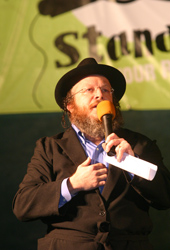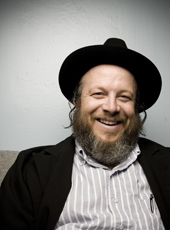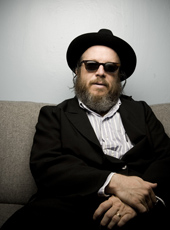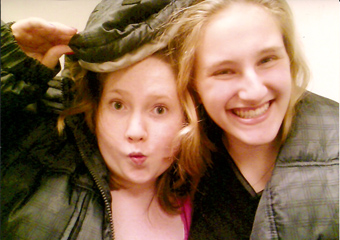
Yisrael doing his standup thing
You don’t meet a lot of Jews named Christopher Campbell.
Well, actually, Christopher Campbell is no longer Christopher. He’s now Yisrael Campbell, but he journeyed on a long and spiritual road to arrive at his new identity.
An American-born Israeli comedian and actor, Campbell will perform for a program of the Young Leadership Division (YLD) of the Jewish United Fund of Metropolitan Chicago and the Young Adult Division (YAD) of Chicago’s Anshe Emet Synagogue, to be held at the synagogue on Saturday, March 28, at 8 p.m. following a Havdalah service.
Back in the 1960s, Campbell was born into a Philadelphia Catholic family, to an Italian mother and Irish father. As Campbell describes it, “I’m the first-born son of a manic-depressive Italian woman and a pathologically silent Irishman. That makes me wildly emotional…in a very quiet way.”
His late aunt was a nun, meaning “she was the bride of Christ,” says Campbell. “The joke is she was my aunt and Jesus was my uncle.” His mother, too, had joined a convent for a while, but eventually left both the convent and her strict adherence to the faith and started a family. Campbell and his younger sister, though baptized, were raised in an unobservant Catholic household. In fact, their mother insisted they attend public rather than parochial school.
At 16, Campbell was diagnosed with alcoholism and drug addiction, and on his quest toward recovery, he sought spiritual guidance. First, he turned to his Christian faith for answers, attending mass and confession, but yearned for an alternative spiritual path. He also gave meditation a try, but says he wasn’t cut out for a Zen life. “I got an 85-mile-per-hour speeding ticket on my way to the Zen center,” says Campbell, laughing at his own irony.
A few years after high school—clean and sober but still on his religious quest—Campbell met a Jewish friend who introduced him to Judaism, specifically the Jewish relationship between people and God. “She told me, ‘If you’re angry at God, yell at God. If you’re happy at God, laugh at God, and if you’re sad, cry,’” recalls Campbell. “I thought that was so profound—and also dangerous. Yell at God? What? Do you want to get struck by lightning? God will kill you. Read the literature. Do you know what ‘smite’ means?”
That same Jewish woman gave him Exodus, the famed novel by Leon Uris about the founding of Israel. “I read that and was so blown away by the story of this tiny little people that survived the Holocaust and went on to found the State of Israel, surrounded by enemies,” says Campbell.
After reading Exodus, he pored over Holocaust literature including books by survivors Elie Wiesel and Primo Levi, and he yearned to visit Israel. “I had this ongoing infatuation with Israel, stories of survival from the Holocaust, Jewish culture—and, of course, Jewish women. [I saw the religion] through rose-colored glasses…” he explains.
Another part of Judaism that resonated with Campbell is that on Yom Kippur, one must right their wrongs with other human beings as well as with God. As a Catholic child, Campbell says, he had felt uneasy about confessing one’s sins against another person in church without apologizing to that person first.
For the next decade, his love for all things Jewish “percolated” and Israel lived on, to him, as a “mythical” place. He figured maybe if he gave it some time, he would come to realize that Judaism wasn’t the right spiritual path for him. But instead, the opposite happened and his interest in the religion grew. While living in Los Angeles and attending drama school, Campbell spotted an advertisement in the back of an L.A. weekly for a Judaism 101 class.

Yisrael Campbell, an American-born Israeli comedian, converted from Catholicism to Judaism 15 years ago
In 1994, at the age of 31, after taking the religion class, he completed a Reform conversion to Judaism, his first of three Jewish conversions in the coming years. His first included immersing in the mikvah (ritual bath) and undergoing a hatafat dam brit (in the case of an already-circumcised Jew by choice, this symbolic “drop of the blood” ritual fulfills the requirements of the brit milah—the covenant of the circumcision).
Around that time, he met an Egyptian non-practicing Muslim woman, whom he married but soon divorced. Then, two years after his first conversion, he grew gradually more religious and made a Conservative conversion, sitting before a beit din (rabbinical court of Judaism).
Campbell then traveled to Israel for a summer, where he lived as a traditionally observant Jew, following all the laws of Judaism, including wearing a beard, black hat, and peyas (religiously uncut portion of hair behind the ears). But despite his strict observance, he longed for acceptance by the entire Jewish community. Because he hadn’t completed an Orthodox conversion, he felt that he wasn’t recognized by all Jews as a member of the tribe.
For instance, as a guest at an observant Jewish wedding, Campbell wanted to chant one of the sheva brachot (seven blessings said according to religious Jewish law at weddings), but his friend urged him to refrain because of his questionable religious status.
So Campbell chose to make a third and final conversion, this time to Orthodox Judaism, repeating a strict conversion process.
He also made aliyah and met his second wife in Israel. Married seven years, they live in a town called Baka, south of the Old City in Jerusalem, with their three children, 3-year-old twins (a son and daughter) and a younger son who will turn two in May.
After moving to Israel, Campbell started going by the name Yisrael, which he had selected as his Hebrew name for his initial conversion to Judaism. “Israelis, unlike Americans, weren’t shy about saying, ‘How can someone who looks like you be named Chris?’ They couldn’t handle it,” says Campbell.
Currently, the comedian and his family are spending the year in Manhattan, where Campbell is working on a one-man off-Broadway comedy show about the story of his life. He’s also been touring the Jewish film festival circuit with
Circumcise Me
(a riff on the title Supersize Me), the 2008 documentary about Campbell’s journey, produced by Matthew Kalman and David Blumenfeld.

Yisrael wears his sunglasses at night
In 2007, Campbell toured with the Israeli-Palestinian Comedy Tour, the first-ever Israeli Palestinian comedy tour, founded by Palestinian comedian and columnist Ray Hanania and Israeli comedian Charley Warady, both Chicagoans. Campbell and Chicago comedian Aaron Freeman, an African-American Jew by choice, joined Hanania and Warady for the tour.
Now that Campbell and his family have returned to the States for a while, his parents get to see their grandchildren often. His mother and father embrace Campbell’s new religious identity, but ask many questions, like why he doesn’t answer the phone on Shabbat and when the family is next celebrating in that “little house holiday” (Sukkot).
When Campbell was visiting his hometown recently, he bumped into a blast from the past—his Irish-Catholic high school prom date. She didn’t recognize Campbell in his peyas, beard, and hat. “‘It’s me, Chris Campbell,’” he said, jogging her memory. ‘Now I see it—do you live around here?’ his former date wondered. “I didn’t say it to her, but my answer in my head was ‘not in any conceivable way,’” says Campbell. “I don’t live here spiritually, I don’t live here physically, and I don’t look like the same person. I’m a different person.”
The cost of the March 28 show is $20 in advance and $25 at the door. This includes dessert, wine, and the program. Register online on the
YLD website
. For more information, contact Ariel Zipkin at
ArielZipkin@juf.org
or (312) 357-4692. Also check it out on
Oy!'s events page
.







.jpg)



